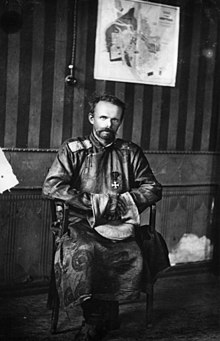
Back رومان فون انجيرن ستيرنبرج ARZ Roman fon Ungern Şternberq Azerbaijani Раман Фёдаравіч Унгерн фон Штэрнберг Byelorussian Роман фон Унгерн-Щернберг Bulgarian Roman Ungern von Sternberg Catalan Roman Fjodorovič Ungern von Sternberg Czech Roman von Ungern-Sternberg German Ρομάν φον Ούνγκερν-Στέρνμπεργκ Greek Roman Ungern von Sternberg Esperanto Roman Ungern von Sternberg Spanish
Roman von Ungern-Sternberg | |
|---|---|
 Ungern-Sternberg in Irkutsk under interrogation at the headquarters of the 5th Red Army, 1921 | |
| Birth name | Nikolai Robert Maximilian Freiherr[a] von Ungern-Sternberg |
| Nickname(s) |
|
| Born | 10 January 1886 Graz, Austria-Hungary |
| Died | 15 September 1921 (aged 35) Novonikolayevsk, Russian SFSR (now Novosibirsk) |
| Cause of death | Execution by firing squad |
| Allegiance |
|
| Branch | |
| Years of service | 1906–1921 |
| Rank | Lieutenant general |
| Commands held | Asiatic Cavalry Division |
| Battles/wars | |
| Awards |
|
| Spouse(s) |
Elena Pavlovna "Ji"
(m. 1919; div. 1920) |
| This article is part of a series on |
| Conservatism in Russia |
|---|
 |
Nikolai Robert Maximilian Freiherr[a] von Ungern-Sternberg (Russian: Роман Фёдорович фон Унгерн-Штернберг, romanized: Roman Fyodorovich fon Ungern-Shternberg;[1] 10 January 1886 – 15 September 1921), often referred to as Roman von Ungern-Sternberg or Baron Ungern, was an anti-communist general in the Russian Civil War and then an independent warlord who intervened in Mongolia against China. A part of the Russian Empire's Baltic German minority, Ungern was an ultraconservative monarchist who aspired to restore the Russian monarchy after the 1917 Russian Revolutions and to revive the Mongol Empire under the rule of the Bogd Khan. His attraction to Vajrayana Buddhism and his eccentric, often violent, treatment of enemies and his own men earned him the sobriquet "the Mad Baron" or "the Bloody Baron".
In February 1921, at the head of the Asiatic Cavalry Division, Ungern expelled Chinese troops from Mongolia and restored the monarchic power of the Bogd Khan. During his five-month occupation of Outer Mongolia, Ungern imposed order on the capital city, Ikh Khüree (now Ulaanbaatar), by fear, intimidation and brutal violence against his opponents, particularly the Bolsheviks. In June 1921, he travelled to eastern Siberia to support anti-Bolshevik partisan forces and to head off a joint Red Army-Mongolian rebel invasion. That action ultimately led to his defeat and capture two months later. He was taken prisoner by the Red Army and, a month later, was put on trial for "counter-revolution" in Novonikolayevsk (now Novosibirsk). He was found guilty after a six-hour show trial, and on 15 September 1921 he was executed.
Cite error: There are <ref group=lower-alpha> tags or {{efn}} templates on this page, but the references will not show without a {{reflist|group=lower-alpha}} template or {{notelist}} template (see the help page).
- ^ Kuzmin 2011, p. [page needed].
© MMXXIII Rich X Search. We shall prevail. All rights reserved. Rich X Search